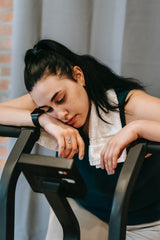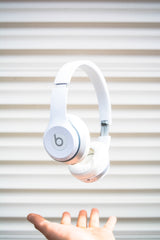Why do I sweat so much when I run?

You’re supposed to sweat during exercise; it’s the body’s way of cooling you down and keeping your temperature within a safe range. Sweating might not always feel that great, but it’s usually a sign that you’re doing something right and it could even be a sign that you’re getting fitter.
Why do I sweat so much when I run?
Running is a powerful form of aerobic exercise and sweating is the body’s response to that increase in temperature. When you start running, your nervous system alerts the sweat glands and they start to release moisture.
This moisture is made up of water, protein, salt, urea and ammonia: sweat.
The sweat on our skin is then evaporated into the air through a process known as thermoregulation and this cools the skin.
There are a number of factors as to why some people sweat more when they run than others.
- Men sweat more than women
- The more body weight you’re carrying, the sweatier you’ll be
- You may be genetically predisposed to sweating more heavily
-
Interestingly, the climate you spend your childhood in will influence how much you sweat. For example, someone who spent their youth growing up in New Mexico will have more active sweat glands than someone who’s childhood was in Finland.
- The temperature and humidity of where you’re running will play a role, too, as will choosing an outdoor trail over an air conditioned gym.
- The clothes you’re wearing could mean moisture isn’t able to evaporate easily (check out sportswear with wicking fabric).
-
How you’re wearing your hair when you run can influence how sweaty you’re feeling, too.
- And surprisingly, if you’re running regularly, you may notice you start sweating earlier into it. The fitter you get the more fine-tuned the body’s response becomes. It knows to start producing moisture sooner in order to regulate your temperature more effectively.
- Too much alcohol, spicy foods or caffeine in your diet can also cause runners to sweat more than usual. Medications for illnesses may also contribute, too.
- For some people, excessive sweating is a medical condition called hyperhidrosis which causes a person to be sweaty even when they aren’t exercising.
There’s no way of truly knowing whether or not you’re sweating more than you should be.
Hyperhidrosis is one exception because its impact goes much further than just when you’re running. People suffering from hyperhidrosis will sweat even when sedentary.
But everyone sweats differently and in different amounts. On average, a person has between 2 and 4 million sweat glands, the number that are active will depend on the individual.
How to deal with sweat when you’re running
One hack is to apply a line of petroleum jelly across the forehead just above the eyebrows and so that the bottom line ‘angles just towards your ears’ this way the sweat rolls off your face rather than into your eyes.
In hot weather, it’s fine to go slower and to adapt your route and pace to the weather. A slower pace will help reduce the amount of thermoregulation required to cool the body. If you can run in wooded areas, too, you’ll find the shade of the trees is surprisingly cool and more pleasant than running out in the open.
How do I stop sweating so much when I run?
- Alter your route or plans when the weather is really hot. In cities and towns, there’s something known as the urban heat island effect which means densely populated areas are hotter than the surrounding countryside. Pavements, roads, homes, buildings, etc, are made from materials that absorb heat and a lack of greenery means the heat has nowhere to go. If you can run away from city centres and hit the trail, park or country, then you’ll have a cooler experience and will sweat less.
- Pick up a good antiperspirant and apply your deodorant the night before so that it has time to penetrate the sweat duct. If you do it in the morning, it’s more likely to be washed away.
-
Reduce your caffeine intake - a cup of coffee stimulates the nervous system which, according to Runners World, activates your sweat glands.
-
Check that you’re running gear is made from breathable fabrics. In hot weather, or on longer runs, switch to sportswear with moisture wicking technology. Wicking just means that the sweat is pulled to the surface of the garment where it can easily be evaporated. If you wear headphones when you work out, then don’t forget to add the same wicking protection to the headphone cushions.
- Limit your alcohol and spicy food consumption before running
- Don’t just keep an eye on the temperature but look at humidity levels, too. Humidity makes it harder for sweat to be evaporated off your skin’s surface so on very humid days take your workout indoors.
- You can use powders in your shoes to help reduce sweating.
- Keep hair out of your face by using a sweatband or a hair tie.
Sweating during a run can be annoying and uncomfortable but for the vast majority of us, it’s absolutely necessary for our health and well being. There are a number of things you can do to help reduce the amount you’re perspiring when running, but if you’re finding that excessive sweating is having an impact on your day-to-day activities outside your runs, then contact your doctor to see if there could be something else going on or to investigate more effective methods of sweat control.
Heading out for a run in over-ear on on-ear headphones?
Don’t forget to add sweat-wicking headphone covers to keep your ears dry and your cushions from flaking and peeling.





